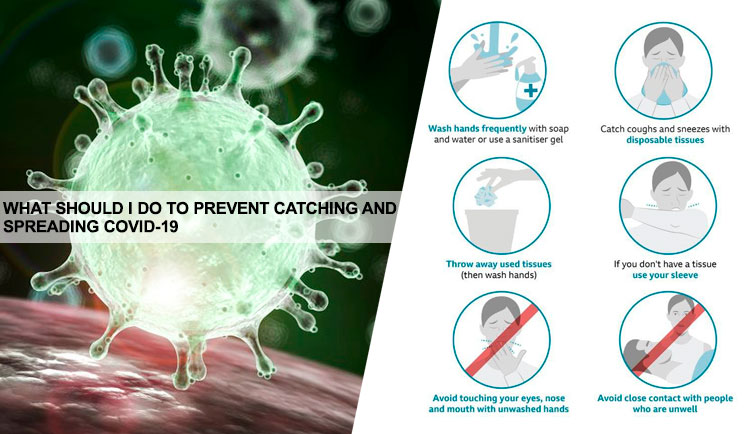COVID-19: Protect yourself & others
What are they and how do I protect myself?
Coronavirus has spread to more than 80 countries, including India. So, what is the disease and how does it spread?
Coronavirus (CoV) is a large family of viruses that cause illness ranging from the common cold to more severe diseases such as Middle East Respiratory Syndrome (MERS-CoV) and Severe Acute Respiratory Syndrome (SARS-CoV). A novel coronavirus (nCoV) is a new strain that has not been previously identified in humans.
Coronaviruses are zoonotic, meaning they are transmitted between animals and people. Detailed investigations found that SARS-CoV was transmitted from civet cats to humans and MERS-CoV from dromedary camels to humans. Several known coronaviruses are circulating in animals that have not yet infected humans.
The best thing is regular and thorough hand washing, preferably with soap and water.
How do I protect myself?
Coronavirus spreads when an infected person coughs small droplets - packed with the virus - into the air. These can be breathed in, or cause an infection if you touch a surface they have landed on then your eyes, nose or mouth. So, coughing and sneezing into tissues, not touching your face with unwashed hands, and avoiding close contact with infected people are important for limiting the spread. Face masks do not provide effective protection, according to medical experts.
What are the coronavirus symptoms?
Coronavirus symptoms 'take five days to show'
It takes five days on average for people to start showing the symptoms of coronavirus, scientists have confirmed. The Covid-19 disease, which can cause a fever, cough and breathing problems, is spreading around the world and has already affected more than 111,000 people.
Coronavirus infects the lungs. The symptoms start with a fever followed by a dry cough. After a week, it can lead to shortness of breath and some people need hospital treatment. The early symptoms can easily be confused with other winter bugs including colds and flu. Most people who develop symptoms do so on or around day five.
Anyone who is symptom-free by day 12 is unlikely to get symptoms, but they may still be infectious carriers. The researchers advise people who could be infectious - whether they have symptoms or not - to self-isolate for 14 days to avoid spreading it to others.
If they follow that guidance, it is estimated that for every 100 individuals quarantined for a fortnight, one of them might develop symptoms after being released.
Do I need to avoid public places?
Most people can continue to go to work, school and other public places. You only need to self-isolate and stay away from other people if you are advised to by a medical professional.
Hence, in this regards, it is desired that the necessary precautions are to be taken to prevent the occurrence of these cases in the Country.
Coronavirus precaution:
10 ways to make sure you do not catch the disease
With coronavirus threatening to run riot in India, here, Sreechithra AyurHome ayurvedic healing center provides you with some important precautions for how you can keep yourself safe from the virus.
As of now, no vaccine has been formulated for the novel coronavirus. In light of this fact, prevention appears to be the best cure available so far.
The main practical thing at the moment is to carry on taking sensible steps to reduce your risk of picking up infections. The virus is thought to be spread by coughs and via contaminated surfaces, such as handrails and door handles in public places. Good hygiene can stop the virus from spreading between people:
Here are the measures you need to take to keep the virus at bay:
Avoid close contact with people who are sick. Maintain at least three feet distance between yourself and anyone who is coughing or sneezing.
Avoid touching your eyes, nose, and mouth.
Stay home when you are sick.
Cover your cough or sneeze with a tissue, then dispose of the tissue safely.
Clean and disinfect frequently-touched objects and surfaces using a regular household cleaning spray or wipe.
Wearing a mask is not necessary unless you are taking care of an infected person. The Centers for Disease Control (CDC) does recommend that only infected people wear masks to prevent the spread of the virus.
Wash your hands often with soap and water for at least 20 seconds, especially after going to the bathroom, before eating, and after blowing your nose, coughing, or sneezing.
If soap and water are not readily available, use an alcohol-based hand sanitiser with at least 60% alcohol. Always wash hands with soap and water when hands are visibly dirty.
If you have a fever, cough and difficulty breathing, seek medical attention immediately.
Keep in mind the travel advisory set out by the Ministry of Health and Welfare.
How fast is it spreading?
Hundreds of new cases are being reported worldwide each day. However, it is thought health agencies may be unaware of many cases. After starting in China, coronavirus is now spreading fast in countries like South Korea, Italy and Iran.
Coronavirus can affect anyone, but people with pre-existing health problems and older people are thought to be at greater risk of developing severe symptoms. Many of the thousands of deaths so far - mostly in China - have involved elderly patients with underlying medical conditions, such as heart disease.
Who is at risk?
Having a health condition does not make you more likely than anyone else to contract coronavirus, but it is important that you take precautions to avoid the infection because your symptoms could be more severe should you get sick.
It appears that people who are older, those with weakened immune systems and people who have underlying chronic conditions including asthma, diabetes or heart disease are more at risk of severe effects. Most people recover from coronavirus quickly after a few days rest. For some people, it can be more severe and, in rare cases, life-threatening.








